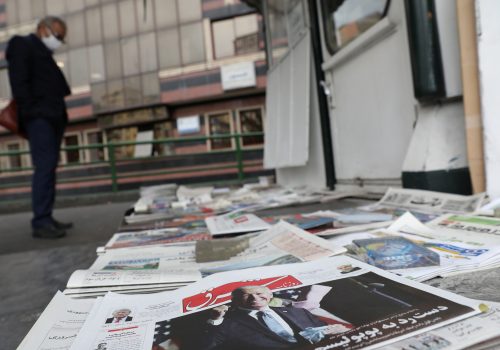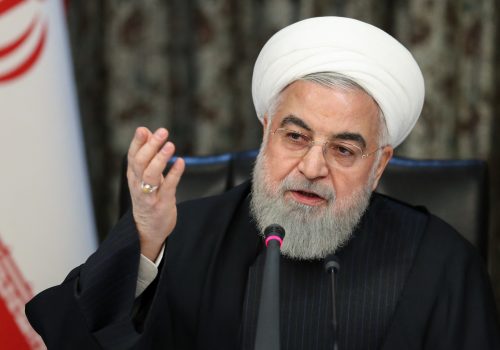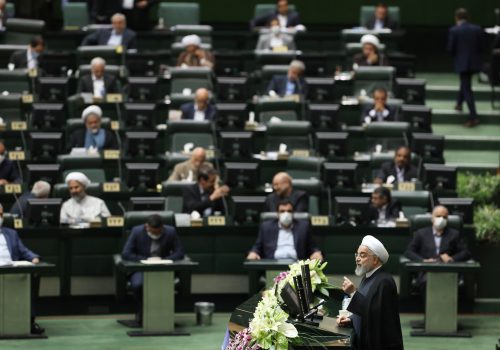Optimism and obstacles for US-Iran relations under a Biden presidency
The election of Joe Biden as the forty-sixth president of the United States has sparked optimism in many quarters that real diplomacy and engagement—not wishful demands for Iran’s total capitulation—will be the preferred method of conducting US policy toward Iran after January 20.
Four years of relentless “maximum pressure” by the Trump administration has brought destruction to the Iranian economy while failing to achieve its stated goals of bringing Iran back to the negotiating table to reach a “better” deal or forcing the Islamic Republic to behave more like a supposedly “normal” nation.
Instead, US-Iran relations experienced their most contentious period since the late 1980s, when Iranian and US forces escorting Kuwaiti tankers clashed in a naval battle in the Persian Gulf. In the past two years alone, Tehran and Washington have gone to the brink of war twice:first, in the aftermath of Iran shooting down a US drone in 2019 and, second, in response to the US assassination of Quds Force commander Qasem Soleimani in early January, when Iran directly targeted American forces in Iraq in retaliation. Tehran has ramped up its nuclear program again and flexed its regional influence in Yemen, Syria, Lebanon, and Afghanistan, as well as Iraq. Instead of “saying uncle,” Tehran has responded to maximum pressure with “maximum resistance.”
A Biden administration could substantially reduce tensions by easing some of the sanctions on the Iranian economy and by explicitly supporting and facilitating the export of humanitarian goods to Iran. Biden is also expected to return to the approach taken by the Barack Obama administration in which he served as vice president—reviving the multilateral diplomacy that led to the Joint Comprehensive Plan of Action (JCPOA) in 2015.
Biden has argued that Iran is a “destabilizing actor” that should never be allowed to develop nuclear weapons. In September, he pledged to return the US to the JCPOA “as a starting point for follow-on negotiations” if Iran returns to “strict compliance.” More recently, a former senior Obama administration official, Amos Hochstein, argued that “in the first months [of Biden’s presidency], we’ll either see him rejoin the deal fully, or what I would call ‘JCPOA-minus,’ meaning lifting sanctions in exchange for suspending some of the Iranian nuclear programs [developed] in the past three years.”
The Biden administration will reach out to its traditional allies—Britain, France, and Germany—as well as the European Union to rebuild the Obama-era coalition that produced the JCPOA. At the same time, European countries will seek to bridge the gap with Iran between the US elections and Biden’s inauguration. In his congratulatory message to the US president-elect, German Foreign Minister Heiko Maas tweeted that “we will only be able to solve… international challenges if we join our forces.” He specifically called on the Biden administration to work closely on Iran. Other European leaders have also expressed the need for renewed cooperation between transatlantic allies.
A return to a multilateral approach is a mixed blessing for Iran, which adroitly utilized the rift between Washington and European capitals to its own benefit. At the same time, Iran has been careful to keep the nuclear deal alive.
However, there are a few hurdles on Biden’s path to renewed diplomacy with Tehran.
For one, time is short before Iran holds its own presidential elections in June 2021. On November 3, President Hassan Rouhani, who will complete his second term next August, noted: “Now, an opportunity has come up for the next US administration to compensate for past mistakes and return to the path of complying with international agreements.” His foreign minister, Mohammad Javad Zarif, argued recently: “What is important for us is how the White House behaves after the election, not what promises are there, what slogans are made.” Zarif has categorically dismissed any renegotiation of the JCPOA, stating, “If we wanted to do that [renegotiate], we would have done it with President Trump four years ago.”
The experience of the US withdrawal from the nuclear accord while Iran was in full compliance has weakened pragmatic forces within the Iranian political system, including Rouhani and Zarif, who have long advocated for better relations with the US. As the prominent Iranian-American scholar Mohamad Tabaar has cautioned, under unprecedented external pressure, Iranian politics have undergone “tectonic shifts,” with the Islamic Revolutionary Guards Corps (IRGC) “in the driver’s seat.” The Iranian military is also preparing for the upcoming presidential elections and a veteran of the IRGC is likely to take over the executive branch. That gives the Biden administration roughly six months to achieve a compromise on the nuclear issue with Iran.
The new US administration is also likely to face a lobbying campaign from Saudi Arabia, the United Arab Emirates, and Israel, who all opposed the JCPOA from the start. Middle Eastern capitals are naturally concerned that US re-engagement with Iran will not only strengthen their adversary but lead to a broader rapprochement between Iran and the US, which would diminish their importance to Washington.
Another challenge to a swift US re-entry to the nuclear deal is the Trump administration’s piling on of new sanctions. Recently, the administration designated eighteen Iranian banks in an effort to “sever Iran from the global financial system” and has promised more penalties in its waning days. The purpose of the sanctions is clear—to further destabilize the Iranian economy and complicate Biden’s outreach to Iran. Iran’s Deputy Foreign Minister Abbas Araqchi recently warned that all unilateral sanctions added since 2017 must be removed if the US wants to return to the JCPOA.
Still, President-elect Biden will have the opportunity to readjust the course of US-Iranian relations after a turbulent four years. In the short period of time that both Rouhani and Biden are in office, they would be well advised to move swiftly into full compliance with the JCPOA, as the next Iranian government is likely to be a tougher and more skeptical negotiating partner.
Sina Azodi is a nonresident fellow at the Atlantic Council and a visiting scholar at the George Washington University’s Institute for Middle East Studies. He is also a PhD Candidate in International Relations at University of South Florida. Follow him on Twitter @Azodiac83.
Image: Iranian President Hassan Rouhani makes statements on recent developments regarding the pandemic process at National Combat Board Meeting with Coronavirus in Tehran, Iran. Credit Image: Iranian Presidency via ZUMA Wire Tehran Iran


